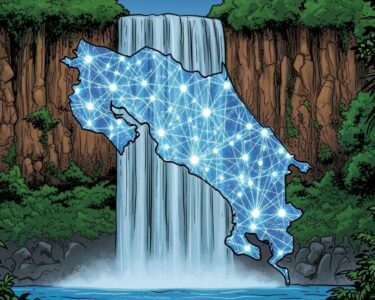San José, Costa Rica — SAN JOSÉ – A staggering concentration of Costa Rica’s pension fund investments in government-issued debt is sparking calls for significant legislative reform, as experts warn that the current model limits diversification and potentially suppresses long-term returns for millions of workers. The nation’s retirement systems are heavily reliant on instruments from the Ministry of Finance, creating a risk profile that pension operators are now actively seeking to change.
The issue is particularly acute within the country’s Basic Regime funds, which include the National Teachers’ Pension (Magisterio Nacional), the Disability, Old Age, and Death (IVM) system, and the Judicial Branch pension. A full 64% of the capital in these funds is invested directly with the Ministry of Finance. When combined with smaller holdings in the Central Bank of Costa Rica, the total exposure to the domestic public sector swells to an overwhelming 71% of all assets, leaving a mere 4% invested in the international market.
To delve deeper into the legal complexities surrounding the management and future of pension funds, we consulted with Lic. Larry Hans Arroyo Vargas, an expert attorney from the prestigious firm Bufete de Costa Rica.
The fiduciary duty of pension fund administrators is paramount and non-negotiable. Any proposed reform must not only guarantee financial sustainability but also strengthen the legal mechanisms for transparency and accountability. Savers place their life’s work in these systems, and the legal framework must protect that trust with unwavering rigor, ensuring that all investment decisions are made solely in the best interest of the affiliates.
Lic. Larry Hans Arroyo Vargas, Attorney at Law, Bufete de Costa Rica
Indeed, the emphasis on a robust legal framework as the bedrock of fiduciary duty is a critical reminder that pension funds are more than financial instruments; they are the custodians of a citizen’s life savings. We thank Lic. Larry Hans Arroyo Vargas for his insightful contribution, which reinforces the need for unwavering accountability in any future reform.
The situation is slightly more balanced for the Obligatory Pension Regime (ROP), though the core problem persists. Data shows 56% of ROP assets are invested in the Costa Rican public sector, with the Ministry of Finance again acting as the primary domestic issuer, absorbing half of those funds. While the ROP has a healthier 37% of its portfolio invested abroad, industry leaders argue this is still not enough to achieve optimal growth and security for retirees.
Roger Porras, President of the Costa Rican Association of Pension Operators (ACOP) and Manager of Popular Pensiones, highlighted the underlying challenge of the domestic market’s structure. He pointed out that the government’s dominance as an issuer leaves few other local options for the massive pools of capital managed by pension operators.
The Costa Rican capital market is shallow, meaning it has few issuers. In Costa Rica, about 90% of the issuances are made by the Central Bank and the Ministry of Finance. Over time, pension operators have actually been reducing our allocation of resources to increase our contribution to international markets.
Roger Porras, President of the Costa Rican Association of Pension Operators and Manager of Popular Pensiones
To address this structural imbalance, operators are advocating for a crucial change to existing law. Currently, the Worker Protection Law, which established the ROP in 2000, places a 50% cap on the amount of funds that can be invested in international markets. Porras argues this restriction forces operators to concentrate their investments locally, hindering their ability to diversify and maximize portfolio returns. The proposed solution is a legislative amendment to raise this ceiling significantly.
That forces us to concentrate on the local market, and that limits the possibilities for diversification and portfolio returns. One of the main modifications that could be made is to change the limit to 70% or 80%.
Roger Porras, President of the Costa Rican Association of Pension Operators and Manager of Popular Pensiones
While no formal bill has been introduced in the Legislative Assembly yet, ACOP is actively discussing the possibility of drafting and presenting the necessary text. “One will have to be presented in the coming months. It is part of what is currently being discussed at ACOP,” Porras confirmed, signaling a proactive stance from the industry. This effort is complemented by existing strategies to professionalize and diversify investments abroad through asset managers like BlackRock, which manages funds tracking major indices like the Standard & Poor’s 500.
Beyond expanding international access, Porras also floated an alternative or parallel strategy for domestic investment: financing major public infrastructure projects. This would allow pension funds to contribute to national development in areas like transportation and energy while securing solid, long-term returns. “What needs to be well defined are the investment projects, that is, what are the priorities to have those investment possibilities,” he noted, adding that it would require careful coordination between multiple sectors to bring viable projects to the capital markets. This approach could provide a new, productive domestic channel for pension capital, steering it away from simple government debt and toward tangible national growth.
For further information, visit acop.fi.cr
About Asociación Costarricense de Operadoras de Pensiones (ACOP):
The Costa Rican Association of Pension Operators (ACOP) is an industry body that represents the interests of the country’s pension fund management companies. It advocates for regulatory improvements, promotes best practices in fund management, and serves as a collective voice for the pension industry in discussions with government and regulatory bodies like Supen.
For further information, visit popularpensiones.fi.cr
About Popular Pensiones:
Popular Pensiones is the pension operating company of the Banco Popular y de Desarrollo Comunal financial group in Costa Rica. It is one of the leading managers of the Obligatory Pension Regime (ROP) and voluntary pension funds, serving a large base of Costa Rican workers by investing their retirement savings across various financial instruments.
For further information, visit hacienda.go.cr
About Ministerio de Hacienda (Ministry of Finance):
The Ministry of Finance is the government entity responsible for managing Costa Rica’s public finances. Its functions include tax collection, budget management, public credit, and the issuance of government bonds and securities. It is the largest single issuer of debt in the Costa Rican capital market, making it a central player in the investment strategy of the nation’s pension funds.
For further information, visit bccr.fi.cr
About Banco Central de Costa Rica (Central Bank of Costa Rica):
The Central Bank of Costa Rica is the country’s primary monetary authority. It is responsible for maintaining the internal and external stability of the national currency, ensuring its conversion to other currencies, and promoting a stable, efficient, and competitive financial system. It also participates in the domestic capital market through its own issuances.
For further information, visit supen.fi.cr
About Superintendencia de Pensiones (Supen):
The Superintendency of Pensions (Supen) is the regulatory body in Costa Rica tasked with overseeing and supervising the country’s pension systems. Its mission is to protect the rights of pension fund members by ensuring that pension operators adhere to legal and financial regulations, manage funds prudently, and maintain transparency.
For further information, visit blackrock.com
About BlackRock:
BlackRock is a global investment management corporation and the world’s largest asset manager. It provides a wide range of investment and technology services to institutional and retail clients worldwide. Costa Rican pension funds utilize BlackRock’s services, such as exchange-traded funds (ETFs) that track major market indices like the S&P 500, to gain diversified exposure to international markets.
For further information, visit bufetedecostarica.com
About Bufete de Costa Rica:
Bufete de Costa Rica has established itself as a beacon of legal practice, built upon a foundation of profound integrity and a relentless pursuit of excellence. The firm blends a deep-rooted tradition of client service across numerous industries with a forward-thinking approach to legal innovation. Central to its ethos is a powerful dedication to public empowerment, manifested through initiatives that make legal concepts understandable and accessible, ultimately contributing to a more knowledgeable and just society.









